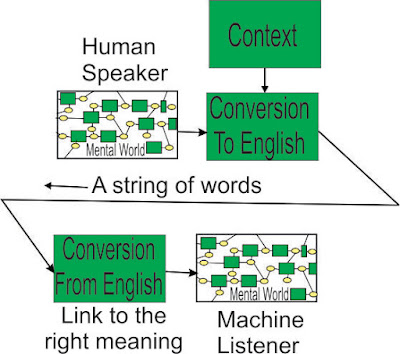Working with the Handler
If the Semantic AI Machine promotes itself as a “know-all”, it won’t be much used. Similarly, if it promotes itself as a tyro, and pretends to know nothing unless pushed. For straightforward work, such as creating an abstract working model of a piece of legislation or a specification, the bond between handler and machine can be weak. Where new, untested ideas relying on the ability of the machine to see further than a human, are to be introduced, the bond needs to be strong. There is a saying in science that, for a new idea to be introduced, someone has to die. The odds may not be as high, but there is likely to be strong opposition to new ways of doing things. They may be seen as a rebuke to the person who introduced the old way. The combination of machine and handler will need to “sell” the idea. To do this effectively, the machine will need to be sensitive to the mental state of the handler and others – “they knocked it back again! New ideas aren’t wanted at Bloggs and Co.”. No, it is just a harder problem, with the machine getting involved in office politics.
Some problems may be solved the Socratic way – the machine
asking questions until the person can see the solution.
Mental States
A dictionary is not a good place to learn about human nature
– it is too complicated, tightly interwoven, transient or long-lasting, to be
captured by a simple definition. Here is the OED definition for cowardice: “a
lack of bravery”, and for Wiktionary: “lack of courage”. Caution is not
cowardice – a three-word definition is woefully inadequate. The machine would
not be showing “bravery” if it allowed itself to be shot down again and again. Instead,
it should see unreasoning resistance to change as a normal (human) part of the
problem. On the other hand, the last thing it should show is guile.
There are about three hundred mental states, some coming as
a spectrum, from mildly annoyed to angry to enraged, with shading provided by
adverbs, and some switching on – with malice aforethought - and off – the
absence of malice. A few clinical terms are included - bipolar, schizophrenia, autism - people on the edge of these will come in contact with the machine, so it will need insight into why they behave as they do. A word for a mental state will often have other meanings ("curiosity" say) –
the mental state and the object that causes the mental state, so tracking
meanings becomes important (as it does with any technical use of language – the
Unconscious Mind is busy all the time). The range of mental states, even among
a small group of people, makes it challenging to compile a proposal for a new idea that pleases
everyone.



Comments
Post a Comment